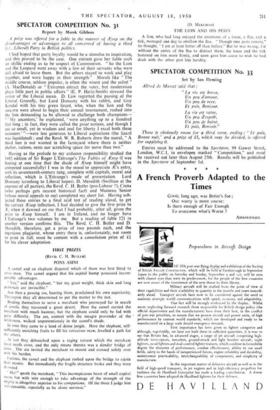A prize was offered for a fable in the manner
of Esop on the disadvantages or advantages to all concerned of having a third (i.e., Liberal) Party in British politics.
I had hoped that party loyalty would be a stimulus to inspiration, and this proved to be the case. One entrant gave her fable such an idyllic ending as to be suspect of Communism. " So the Lion and the Leopard went away with a few of their servants who were still afraid to leave them. But the others stayed to work and play together, and were happy in their strength." Morals like " The middle course, seldom popular, is often the wisest and the safest " (A. MacDonald) or " Extremes attract the voter, but moderation plays little part in public affairs " (E. P. Heriz-Smith) stressed the virtue of the Liberal mean. D. Law regretted the passing of the Liberal Greenfly, but Lord Dunsany with his rabbit, and Guy Kendal with his tiny green lizard, who, when the lion and the unicorn were about to begin their annual tournament, rushed into the lists demanding to be allowed to challenge both champions- - My ancestors,' he explained, ' were anything up to a hundred feet long ; in fact, they were called the great surians, and though I am so small, yet in wisdom and zeal for liberty I excel both these monsters' "—were less generous to Liberal aspirations (the lizard was liquidated) ; and the Revd. W. R. Roberts drew the moral,," A third hen is not wanted in the farmyard where there is neither shelter, rations, nests nor scratching space for more than two."
Having as the prelude to my arduous responsibility studied the 1692 edition of Sir Roger L'Estrange's The Fables of .Esop (I was hoping at one time that the shade of AEsop himself might have competed successfully) I was in the mood to appreciate AE's entry, with its seventeenth-century tang, complete with capitals, moral and reflection, which is L'Estrange's mode of presentation. Lord Dunsany (crushing to Liberal hopes), D. Meredith (Swiftian at the expense of all parties), the Revd. C. H. Butler (pro-Labour ?), Cinna (who perhaps gets nearest historical fact) and Moineau Senior (whose moral appeals to me) completed my short list. Having sub- jected these entries to a final acid test of reading aloud, to get the correct zEsop inflection, I had decided to give the first prize to 1E, when it dawned on me that I had probably, after all, given the prize to iEsop himself. I am in Ireland, and no longer have L'Estrange's two volumes by me. But a reading of fable 121 in another version confirms this. The Revd. C. H. Butler and D. Meredith, therefore, get a prize of two pounds each, and the ingenious plagiarist, whose entry there is, unfortunately, not room to print in full, must be content with a consolation prize of £1 for his clever adaptation.
FIRST PRIZES
(REVD. C. H. BUTLER) PONS ASINI A camel and an elephant disputed which- of them was best fitted to serve man. The camel argued that his capital hump possessed incom- parable advantages.
Yes," said the elephant, " but my great weight, thick skin and long proboscis are invincible."
Just then a passing ass, hearing them, proclaimed his own superiority. Thereupoit they all determined to put the matter to the test.
Binding themselves to serve a merchant who journeyed far in search of jewels, they traversed a great desert. Here the camel carried the merchant with much hauteur, but the elephant could only be fed with great difficulty. The ass, content with the meagre provender of the ' wilderness, walked unpretentiously in the camel's shade.
In time they came to a land of dense jungle. Here the elephant, self- sufficiently snatching fruits to fill his voracious maw, levelled a path for the others.
At last they debouched upon a raging torrent which the merchant must needs cross, and the only means thereto was a slender bridge of laths. The ass invited the merchant to mount and crossed safely over with his burden.
Furious, the camel and the elephant rushed upon the bridge to rejoin their master. But immediately the fragile structure broke and they were
drowned. .
" Ho!" quoth the merchant, "This inconspicuous beast of small capital assets but with wits enough to take advantage of the strength of the mighty is altogether superior to his companions. Of the three I judge him Ltidivensable, especially as he alone survives." (D. MEREDITH
THE LION AND HIS PESTS
A lion, who had long enjoyed the attentions of a louse, a flea, and a tick, managed one day to swallow the flea. "Though two pests remain," he thought, " I am at least better off than before." But he was wrong; for without the antics of the flea to distract them, the louse and the tick battened on him more firmly, and soon gave him cause to wish he had dealt with the other pest less harshly.


































 Previous page
Previous page